12 Students Summoned In Iran On Eve Of Mahsa Amini's Anniversary
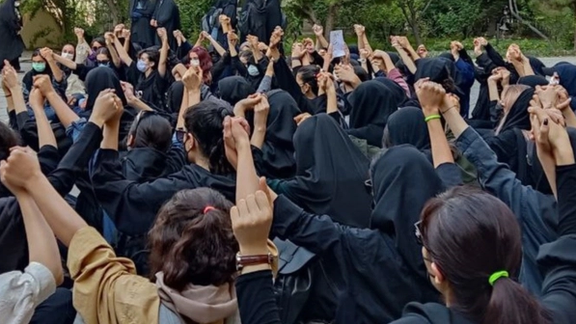
As the first anniversary of Mahsa Amini's death at the hands of the hijab police gets nearer, a wave of heightened security measures has surged across universities.

As the first anniversary of Mahsa Amini's death at the hands of the hijab police gets nearer, a wave of heightened security measures has surged across universities.
Reports have emerged that security authorities, under undisclosed identities, have reached out to several students including those from Tarbiat Modarres University. A total of 12 students have been summoned to report to the Ministry of Intelligence and sign pledge documents. The summoned students have not been informed of the rationale behind their summonses, and the legal foundation for these actions remains unclear.
Student union councils across the country assert that security is heightening as the first anniversary of Amini’s death approaches on September 16th.They insist that these moves indicate the regime's apprehension regarding potential student-led protests.
In a parallel development, sources have revealed that security institutions within the Islamic Republic have initiated a similar campaign of summoning individuals detained during last year's protests. These individuals have been coerced into pledging not to engage in any form of public or virtual activism during the second week of September, the time when Amini died a year ago. Failure to comply with these directives has been met with the threat of arrest.
A recent report from the United Nations High Commissioner for Human Rights disclosed that a minimum of 20,000 individuals were arrested by agents of the Islamic Republic during the revolutionary uprising, either for their active participation in the protests or for their support of the movement. Although some of these detainees were provisionally released on bail, their cases remain unresolved.

The United States has confirmed that five Americans have been released from prisons in Iran and are under house arrest, after what reports say is a deal with Tehran.
Iranian sources told the media that the deal would unfreeze $6 billion in Iranian funds in South Korea and some Iranians from US prisons.
"We are relieved to learn that Iranian authorities have released five US citizens -- Siamak Namazi, Morad Tahbaz, Emad Sharghi, and two individuals who at this time wish to remain private -- from prison to house arrest, State Department spokesperson Matt Miller told the media.
“We are in touch with the families of US citizens involved, and we continue to monitor these individuals’ health and welfare closely. While we welcome the news of these individuals’ release from prison to house arrest, they should never have been imprisoned in the first place. We continue to work diligently to bring these individuals home to their loved ones.They must be allowed to depart Iran and reunite with their loved ones as soon as possible," Miller added.
Allowing the five to leave Iran could take weeks, Reuters said, while it is not clear if all the details of releasing the funds held in South Korea have been agreed or not.
"The move by Iran of the American hostages from Evin Prison ... is an important development," Jared Genser a lawyer representing Namazi said in a statement. "While I hope this will be the first step to their ultimate release, this is at best the beginning of the end."
White House National Security Council Spokesperson Adrienne Watson confirmed that the five were all out of prison and under house arrest, saying they should never have been detained and the White House would have little more to add because talks for their eventual release "remain ongoing and are delicate."
Iran's mission to the United Nations, however, told Iranian state media the release of the dual nationals from prison was part of a US-Iranian prisoner exchange deal.
"Under the deal mediated by a third country, five Iranians jailed in the United States will be released and Iran's frozen funds in South Korea will be unblocked and transferred to Qatar," the mission said, according to state news agency IRNA.
DEPARTURE FROM IRAN COULD TAKE WEEKS
Iranian Americans, whose US citizenship is not recognized by Tehran, are often pawns for the Islamic Republic which has a long history of taking Westerners hostage to use as leverage against the United States and European governments.
The five Americans will be allowed to leave Iran after $6 billion of Iranian funds in South Korea are unfrozen, a source told Reuters. A second source familiar with the talks said it could be weeks before the US citizens leave Iran, saying September was a possible time frame. He confirmed unfreezing the funds may be part of the deal.
However, he said the funds, if transferred from the South Korean banks to another financial institution, would go from one restricted account to another and could only be used for humanitarian purposes such as buying food or medicine.
Iran's semi-official Tasnim news agency said the funds were first to be converted from the South Korean currency into Euros and then sent to an account in Qatar that Iran could access.
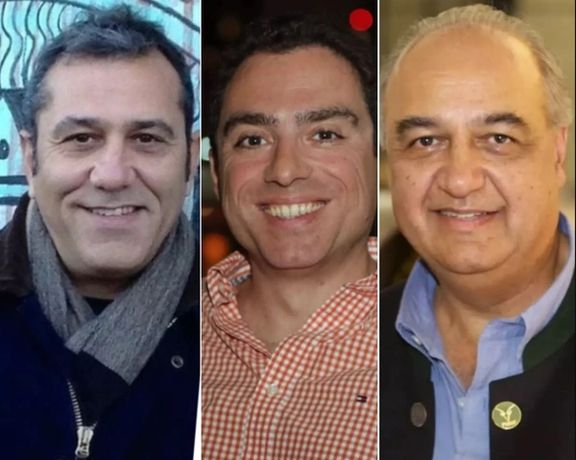
The potential transfer drew immediate Republican criticism that President Joe Biden, a Democrat, had effectively paid a ransom for the US citizens and that Iran using the money for humanitarian goods could free up funds for its nuclear program or to back militias in nations such as Iraq, Lebanon and Yemen.
Henry Rome, an analyst at the Washington Institute for Near East Policy, told Reuters the deal could help reduce tensions that have boiled since then US President Donald Trump, a Republican, withdrew from a 2015 nuclear deal designed to curb Iran's atomic program.
Rome described the potential release of the five as a step forward "in the broader US efforts to de-escalate tensions in the absence of a nuclear agreement" adding that the White House "wouldn't have gone through with the deal if it wasn't confident it could withstand whatever political blowback is forthcoming."
Karim Sadjadpour, a Carnegie Endowment for International Peace analyst, told Reuters that Iranian Americans should still avoid travel to Iran.
"This deal will reinforce the view of (Iran's) Revolutionary Guards that hostage taking is a lucrative practice with minimal costs," he said.
Namazi, who in 2016 was convicted of espionage-related charges the United States has rejected as baseless, has been detained by Iran for more than seven years.
Tahbaz was arrested in 2018 and sentenced to 10 years in prison for "assembly and collusion against Iran's national security" and working for the United States as a spy. Sharghi was convicted of espionage in 2020 and also sentenced to 10 years.
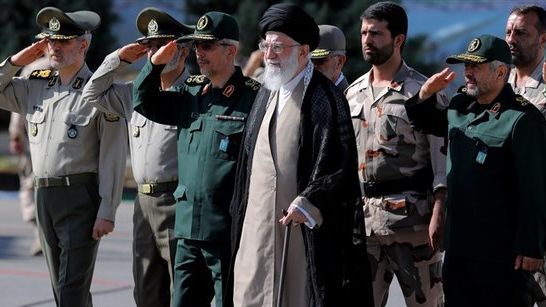
Politicians, diplomats, opposition leaders and activists convened Thursday to urge the UK and EU nations to designate Iran's Revolutionary Guards Corps (IRGC).
During a roundtable online conference hosted by The Jerusalem Center for Public Affairs, speakers gave passionate calls for a galvanization in the international fight against the dangerous military arm of the Iranian regime coupled with impassioned and insightful discourse.
Last week, Britain's home secretary Suella Braverman said Iran's Revolutionary Guard poses a serious risk to UK’s national security amid fresh evidence of its reach.
British-Iranian activist Vahid Beheshti, who was on hunger strike and camped outside London’s Foreign Office earlier this year as part of his bid to raise awareness about atrocities being committed in his homeland and to pressure Prime Minister Rishi Sunak's government to proscribe the IRGC as a terror organization spoke from his mobile phone from London. “Suella’s comment was a great big step in our objective and now I think we are not far from proscription,” he said, offering hope to the many lobbying, while intelligence revelations last week showed Iran to be the biggest threat to the UK.
Lord Stuart Polak, a vocal opposer of the Iranian regime praised Beheshti’s continued campaign and said that combined with the work of journalists in the UK, “the pressure is beginning to tell”. Stressing the need to keep the pressure on the government, he said: “We need to keep lobbying and it will happen, it is about just how long it takes.”

Mohsen Sazegara, Former Iranian Deputy Prime Minister, claimed that 90% of Iranians are ready to remove the regime. “The dominant discourse at the heart of this revolution is a call for democracy and human rights and desire to join the trend of globalization in the world,” he said, as Iranians face the worst economic crisis in decades, many pushed below the poverty line and desperate for a ray of hope.
Other key speakers came from the US, where calls come from both Republicans and Democrats to proscribe the IRGC. David Wurmser, Former Adviser on Middle East to US Vice President Dick Cheney called IRGC the “primary agent of chaos” and stressed the need to move forward with designation without considering any deals.
John Bolton, Former US Ambassador to the UN, who called Iran a “rogue state” said the biggest opportunity for pro-democratic forces in Iran will come when the 84-year-old Supreme Leader Ali Khamenei dies and there is a regime change. “This will be the point when the government is most vulnerable and most fragile and although it is a day that may appear to be remote, it could happen any day and we need to be ready for it.”
The discussion was bolstered by points from European politicians such as Giulio Terzi di Sant'Agata, former Italian Foreign Minister, who stressed that the sanctions taken against a few IRGC individuals was not enough and that “we need to continue until we have obtained our objective that IRGC are on the blacklist.” The issue of proscription has caused division in the EU, like in the UK and US, where the nuclear agenda weighs heavily on the minds of lawmakers. Agata called for all EU member states to ban the IRGC and rally against the “crimes of aggression” that the group is perpetrating at home and abroad.
Israeli Minister of Intelligence, Gila Gamliel gave opening remarks to the roundtable, titled ‘The Path to a Democratic Iran’ during which she said: “On behalf of the free world we urge our friends in the UK and EU to take a stand today for moral clarity and outlaw IRGC.”
She said the 88 million Iranian people were being held hostage to terror and torture and that the international community must give Iranians support to see a way for solutions towards freedom and democracy. “The people of Israel stand firmly with the people of Iran and time is of the essence,” she said.
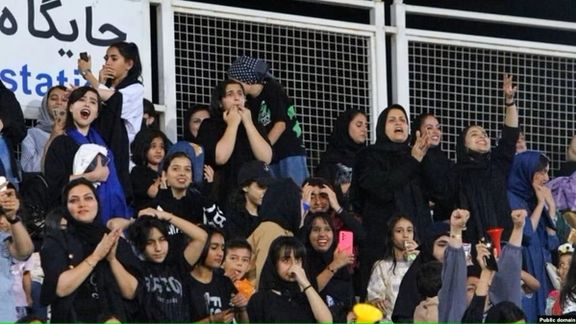
Prompted by stern warnings from FIFA and the Asian Football Confederation (AFC), Iran has reluctantly permitted women to attend a football match outside Tehran.
On Wednesday, women were part of a crowd of local spectators cheering on their teams at a football (soccer) match at Sirjan Stadium in Kerman Province between the city's team and Khuzestan's Foulad FC. It was the first time in 44 years that women have been allowed to attend a football match outside of the capital city.
Just days prior, FIFA and the AFC had expressed serious reservations about Iran's persistent exclusion of women from attending football matches. Permitting women to enter the stadium in Sirjan could have been in response to the mounting international pressure, Shargh daily in Tehran reported.
Although the presence of women at the Sirjan Stadium was extensively promoted through local media, the Iranian press opted to restrict coverage, releasing only a handful of photographs to the public. Notably, several attending women were observed without the mandatory hijab.
It is still not clear if the development in Sirjan is a lasting policy change by the Islamic Republic. Women’s presence in stadiums outside of Tehran has become a controversial issue in recent years. FIFA have been calling for women's entry into stadiums for years, but Iran's Football Federation and other relevant entities had persistently delayed its full implementation.
The Iranian regime's handling of women's participation in football matches has remained under global scrutiny. While there were some limited concessions granted last year, allowing women a controlled entry, the government's reaction to nationwide protests eventually resulted in the revocation of this privilege, leading to months of matches conducted without spectators.
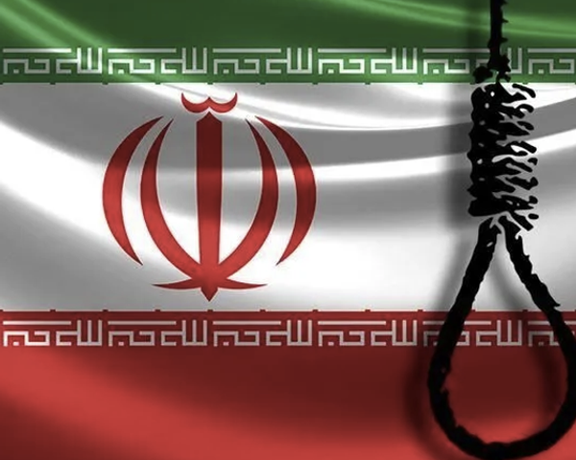
Human rights organizations have raised alarm over more executions in Iran, with at least nine individuals hanged in the past two days alone.
Four prisoners were executed for alleged drug-related crimes, while five men from Marand faced execution on charges of rape. The situation has garnered international attention as concerns mount over the Iranian government's capital punishment practices.
On Wednesday, Manouchehar Khazaei, a former member of the police force, was executed in Hamedan for drug-related offenses. Additionally, Hossein Nasiriyan and Hasan-Ali Shakib were hanged on Tuesday in Shiraz Central Prison, both on drug-related charges. Another prisoner, Ahad Hashemi, was executed in Hamadan prison on Wednesday after spending seven years in jail for drug crimes.
Meanwhile, the execution of five men from the northwestern city of Marand for alleged rape was carried out on Wednesday, though the identities of the executed individuals have not been disclosed by Iranian authorities or media.
The human rights organization Hengaw has further expressed concern regarding potential death sentences for four protesters from Sanandaj, accused of "moharebe" or "war against God" during the revolutionary uprising.
These executions coincide with a recent report from the United Nations High Commissioner for Human Rights, highlighting a distressing trend of increased capital punishment in Iran. The report revealed that in 2022, 582 individuals were executed—a staggering 75% rise compared to the previous year's figure of 333. Notably, this included the execution of three juveniles.
In 2023, alarming parallels persist, with 94 executions recorded in January and February alone. The report also highlights the execution of several individuals allegedly involved in nationwide protests.

The US State Department reiterates its commitment to Iranian women's rights amidst President Ebrahim Raisi's comments on intensified hijab enforcement.
Matthew Miller, the State Department Spokesman, on Wednesday emphasized the importance of allowing women to make personal choices about their attire.
"It is our belief, as we’ve said before, that women in Iran and everywhere should be free to wear what they want," said Miller. "Iranian women should not have to worry about Iranian authorities using surveillance technology or any other methods to impose control over them. The United States has and will continue to take action to support the human rights and fundamental freedoms of the people of Iran, including women – the women and girls of Iran, and to work with allies and partners to pursue accountability for the perpetrators of human rights abuses."
Raisi's recent statement, issued on Wednesday, threatened an end to protests against the hijab, attributing them to foreign influences. He pledged to employ a response to quell the protests and "raise awareness" among those not adhering to the hijab.
"Certain individuals, not adhering to hijab, may lack awareness. Our duty is to raise their awareness,” Raisi asserted, adding that "foreign influences are orchestrating an organized campaign to abolish the hijab."
Raisi's announcement comes against the backdrop of ongoing defiance by Iranian women and girls against the compulsory headscarf. Notably, Raisi's comments arrive weeks before the anniversary of the tragic death of Mahsa Amini while in the custody of the morality police.